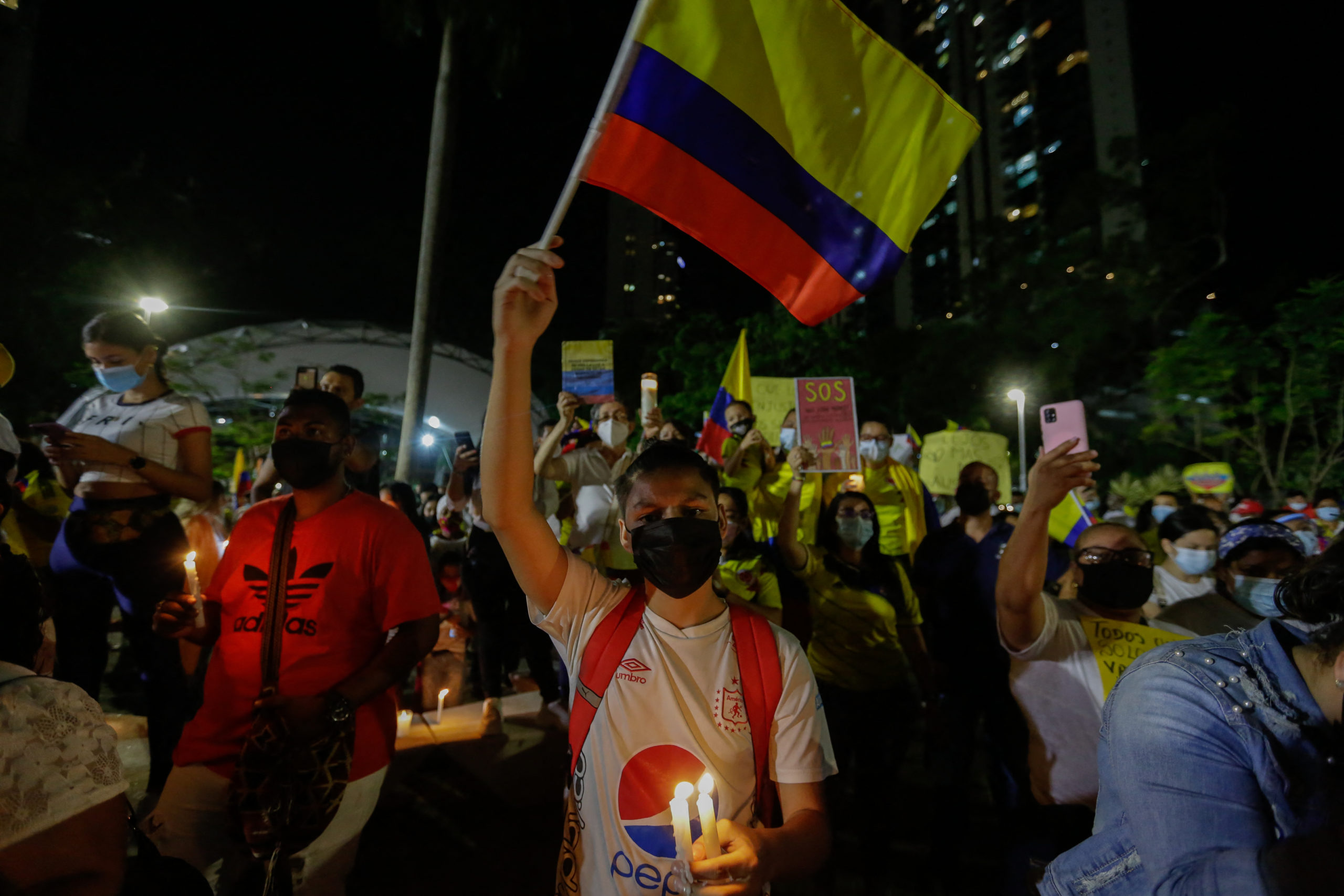Pressure mounts on Colombia as protests begin second week

Colombian residents in Panama protest against Colombian President Ivan Duque’s government in support of protests taking place in their country, at the Urraca Park in Panama City, on May 5, 2021. – Colombian residents in Panama demonstrated in rejection of the government of Ivan Duque for the violent confrontations with the police occured during protests against a tax reform bill in which protesters were killed and injured. AFP
BOGOTA — Thousands of demonstrators poured into Colombia’s streets Wednesday to protest the policies of President Ivan Duque, the eighth straight day of protests that have left at least 24 dead and hundreds wounded.
Students, unions, indigenous people and other groups assembled Wednesday in the capital Bogota as well as the cities of Medellin in the northwest and Cali in the southwest.
The demonstrators are protesting the Duque government’s policies on health, education and security, as well as the violent repression by security forces.
According to official figures, at least 24 people have died — 18 of whom were shot — with more than 800 others wounded and 89 people reported as missing during the week.
However exact figures vary, with the Temblores NGO reporting 37 people dead. Reporters Without Borders meanwhile said that 76 journalists were assaulted, 10 of whom were injured by security forces.
Demonstrators staged protests at various points around Bogota on Wednesday, holding banners with slogans such as “Duque resign.”
Presidential adviser Miguel Ceballos said that the government will meet with demonstrator representatives “next week.”
Thousands, most wearing face masks to prevent the spread of Covid-19, gathered at the downtown Plaza Bolivar near the presidential headquarters. Police prevented one group from entering Congress.
Despite calls for calm from the international community, fresh havoc was wreaked in the capital overnight.
“Police are attacking us … we’re not vandals,” said a 36 year-old woman named Natalia who declined to give her last name. She was in a demo of people dressed in mourning garb.
The demos have been mostly peaceful, but have turned violent in some cities.
Thirty civilians and 16 police officers were wounded in attacks on police stations, the Bogota mayor’s office said.
The aftermath of the clashes were visible Wednesday in the form of torched police stations, vandalized bus shelters and banks, and smoldering tires.
“It hurts to see this but what hurts even more is the negligence of a deaf government that prefers to send out the security forces, that instead of helping (the people) prefers to help the banks, the big businesses,” Hector Cuinemi, a 19-year-old student in Bogota, told AFP.
Around 8,000 people took to the streets of Medellin, Colombia’s second-largest city, by mid-morning, chanting slogans against Duque’s powerful political mentor, former president Alvaro Uribe.
Many roadblocks remained in Cali — Colombia’s third most populous city and one of the most violent in Latin America — causing fuel shortages and concern over the delivery of medical supplies as the country endures a second wave of coronavirus pandemic infections.
Several thousand indigenous people joined the city’s protests.
‘Excessive force’
Protests first broke out on April 28 against a proposed tax reform — which has since been withdrawn — following a call from the National Strike Committee, which represents groups such as unions, indigenous people and civil associations.
On Tuesday the United Nations, European Union and United States, as well as human rights organizations, criticized Colombian security forces for “excessive use of force.”
One of the worst incidents took place in Cali late Monday when five people died and 30 were wounded in violence there.
The government blames the violence on armed gangs, including dissidents of the disbanded leftist FARC guerrillas, members of another leftist rebel group, the ELN, and drug traffickers.
Duque hit out at “a criminal organization that hides behind legitimate social aspirations to destabilize society and generate terror.”
The president has previously promised to open “spaces for dialogue” with the various protesting sectors, although he has defended the security forces and said they are the main victims of the violence.
The social unrest comes just over a month ahead of the start of the Copa America, jointly hosted by Colombia and Argentina.
South American football’s governing body CONMEBOL moved five continental club matches that were to be played this week in Colombia to other countries.
But Duque vowed that the Copa America would continue to be jointly hosted by Colombia.
“The Copa will happen… in the two countries. I think it will be an important message at this time,” he said.
The anti-government protests come at a time of economic despair for many, fueled by the global coronavirus crisis.
In its worst performance in half a century, Colombia’s GDP shrank 6.8 percent in 2020, and unemployment stood at 16.8 percent in March.
Almost half the population lives in poverty, according to official figures.